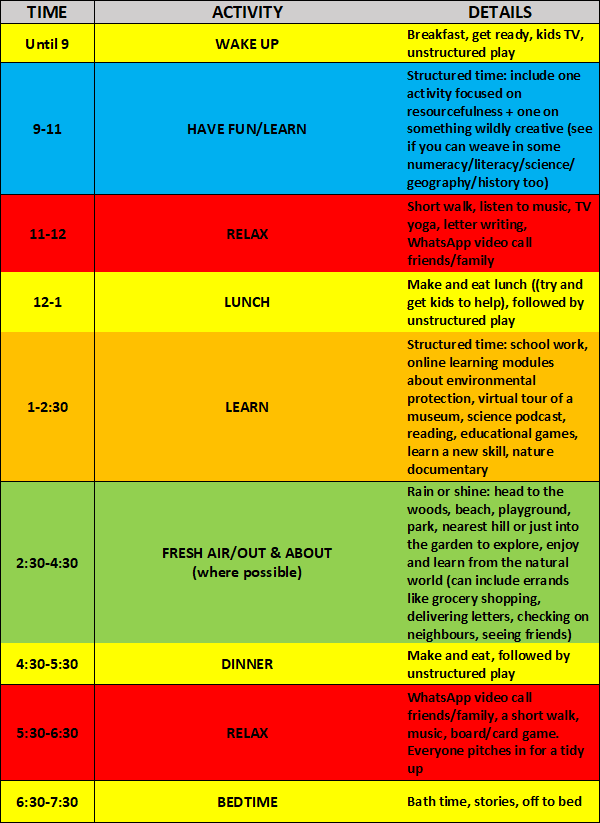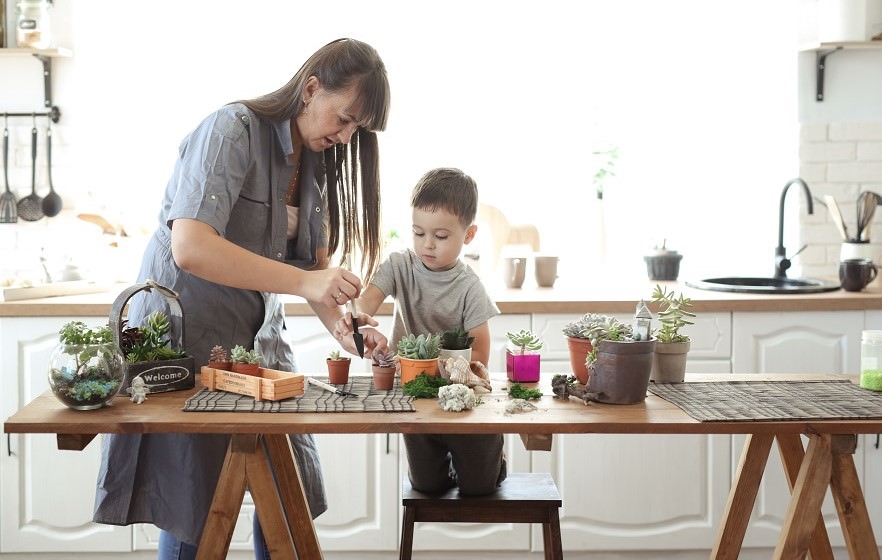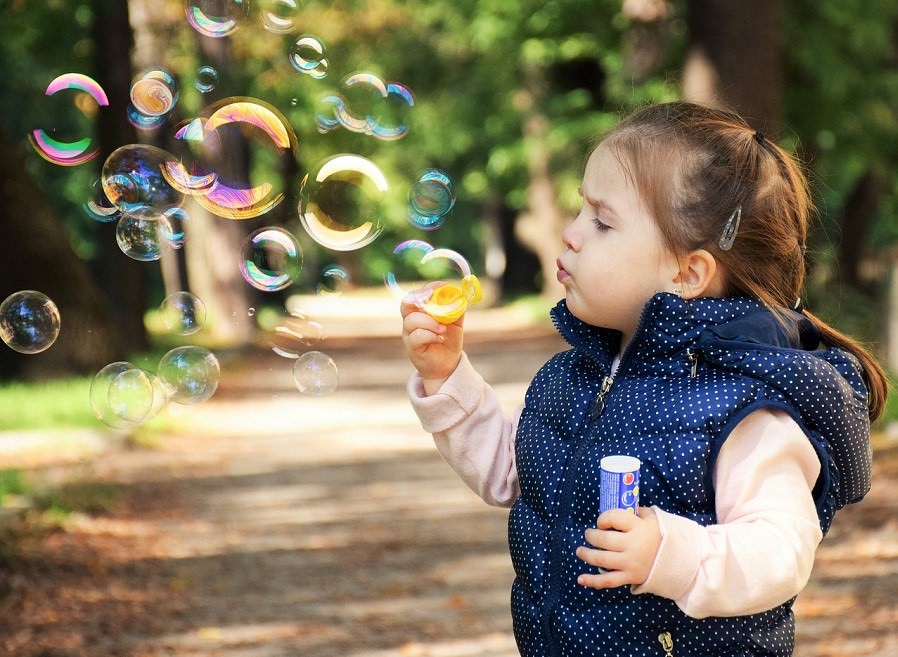School and nursery closures are upon us in the UK as the serious health crisis unfolds beyond our control. In preparation, I thought I’d better come up with a plan of action to keep my family sane for when we’re all thrown together indefinitely — I have two children who are nearly 3 and 6.
A little bit of structure goes a long way — for adults and children alike — so I have created an activity timetable (see below). I’m feeling a little better already.

I set aside blocks of time for the day-to-day necessaries — cooking, exercise, bathtime — but also included activities that center around resourcefulness, imaginary play, and community-mindedness. My goal is that these activities bring a sense of higher purpose in these challenging times.
The timetable is geared towards younger kids and is available as a free PDF on my website. Called A Plan of Action for Families — Spring 2020, it lists a variety of environmental awareness and educational activities for children with links to helpful resources.
Teaching Resourcefulness & Wasting Less
Resourcefulness activities abound, and they’re not just for children. Explore your garden, the recycling bin, the dried goods cupboard — you’ll find plenty to craft, build, and learn with. Build a den, make your own playdough, rediscover paper-mache, and do some simple home science experiments with baking soda, vinegar, and food coloring. Making things reaches parts of the brain that shop-bought kits and crafts don’t.
Rummage for those under-used or forgotten about food items at the back of your cupboards; explore the versatility of peanut butter, mackerel, and marmite (if you have it!); and Ecosia some recipes for that medley of seemingly incompatible items in the fridge. Plant some herbs, pickle some vegetables, learn how to store fresh produce properly so it lasts longer, dry some apple rings. And when the kids demand their favorites, try making your own pizza dough, nachos, baked beans, and energy balls. Let your child help and explain the importance of not wasting food.

Image: Adobe Stock
Review which single-use items you could replace with reusables for some easy-win “Very Resourceful” family points. Feel fabulously self-sufficient about your washable wipes, sanitary products, or sandwich wraps. And if you run out of loo roll, this might just be the opportunity you’ve been waiting for to try family cloth. (Please, don’t flush anything other than toilet paper down the loo — no kitchen roll, no hankies, no wipes. Blocked sewers are the last thing we need!)
Try making your own cleaning products; if you use only natural ingredients, your children can help. You’re likely to have some of the ingredients in your cupboard already. Make your own hand sanitizer and explain to your children when, why, and how to use it.
Cultivating Imaginations To Raise Change-Makers
Nourishing our imaginations is a vital life skill. And it comes alive in the unlikely, oft-dreaded state of being bored. So, when you hear your children say the B-word, jump at the chance to suggest something completely different, perhaps even bonkers. Put your pajamas back on, make a snowman out of cardboard, dress up as woodland creatures and have a picnic in the garden, swap roles for an hour and you do whatever your child tells you to.
There are a number of online activities for children related to the impact we’re having on our natural world, including videos, infographics, and stories. Now’s the time to fire up your child’s imagination and role play as an ocean rescue reporter, invent a world-saving superpower, get into some powerful and visionary storytelling.
People with imagination are not just living life, they are rewriting the rule book. I call this a superpower and all children have it: the ability to imagine things to be different. To be better. So, when a child wants to change something, they just go ahead and try to do it! And a person who can imagine things being better has hope. Hoping the world can be a cleaner, safer place makes us determined and fearless. And in difficult times such as these, it makes us press onwards.

Image: Daniela Dimitrova from Pixabay
Taking Stock & Building Cooperative Relationships
It is spring after all, though I must admit I’ve hardly noticed. Declutter and reorganize. Sift out toys, clothes, and anything else that you think somebody else might enjoy more than you do. There has never been a better time to swap (well-cleaned) toys, games, and anything else with other families. Offer to swap skills, too, and teach your child about the sharing economy. Talk to them about guardianship rather than ownership of stuff, and that sharing skill leaves everyone better off.
Reflect on the importance of family, friends, and community networks for both emotional and practical support. Video call family and friends, host playdates if possible and safe (and free up other parents to get an hour or two to themselves). Help provide, if you can, support for isolated elderly residents in need of essentials, a child’s drawing, a phone call. Helping others is a powerful antidote to materialism and helps reduce stress as well.
And remember the smaller businesses that are really going to suffer. Buy from them when possible. Send them a note of support and reassurance that you’ll be back with a vengeance when they re-open if they are forced to close. And coordinate with neighbors for bulk buys from local producers.
Keep a Scrapbook & Keep Safe
Don’t forget to keep a scrapbook of all that you achieve over the coming weeks. And be sure to include rewards for any progress to keep your child motivated. I hope this is a gentle reminder of how — even during a time of crisis — we can all be doing so much more to take care of our world and each other. Good luck to you all and stay well.
This article was also published on ecohustler.com.
About the Author
Anya Hart Dyke is author of Our throwaway society – raising children to consume wisely. A mother of two with a background in sustainability, she lives in Scotland. Follow her on Twitter and Instagram.
You Might Also Like…
At-Home Pandemic Activities to Keep Your Family Sane
March 27, 2020Earth911 Inspiration: What Provides Survives — Simon M. Lamb
March 27, 2020DIY Men’s Personal Care Products
March 26, 2020The post At-Home Pandemic Activities to Keep Your Family Sane appeared first on Earth911.com.
from Earth911.com https://ift.tt/3anZ1mb https://ift.tt/2vVXV2c
Comments
Post a Comment